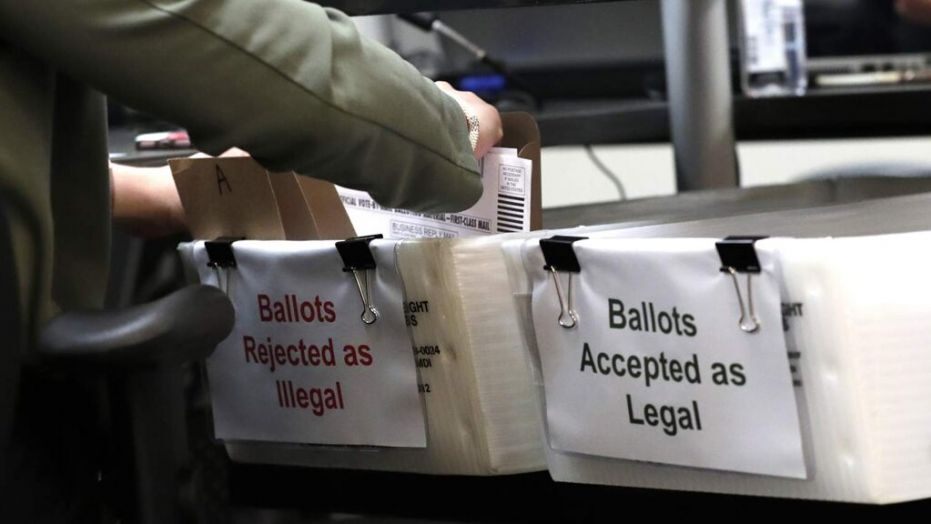Advertisement
Republicans have tried boosting Green Party candidates in previous election cycles to siphon votes from Democrats. They are at it again this year — but it hasn’t always worked.

Four years ago, the Green Party candidate played a significant role in several crucial battleground states, drawing a vote total in three of them — Wisconsin, Michigan and Pennsylvania — that exceeded the margin between Donald J. Trump and Hillary Clinton.
This year, the Republican Party has been trying to use the Green Party to its advantage again, if not always successfully.
In Wisconsin, a G.O.P. elections commissioner and lawyers with ties to Republicans tried to aid attempts by Howie Hawkins, the current Green Party presidential candidate, to get on the ballot there, which were ultimately unsuccessful. In Montana, state regulators found that the Republican Party violated campaign finance laws as part of an effort to boost the Greens in five down-ballot races, including for senator and governor.
And in Western Pennsylvania, petitioners from Florida and California were brought in to gather signatures for Mr. Hawkins by an outside firm whose actions Mr. Hawkins and the party said they could not account for. Mr. Hawkins also did not make the ballot there.
With Mr. Trump trailing Joseph R. Biden Jr. in most national and swing-state polls, Republicans are again trying to help third parties that may appeal to Democratic voters and siphon off votes from Mr. Biden. This is taking place alongside a broader pattern of disinformation and skepticism by the president and his allies that has sown confusion and undermined confidence in the election.
Supporters of the president have also been trying to advance the candidacy of Kanye West, the billionaire hip-hop artist, confident that he can cut into Mr. Biden’s vote total. Democrats have portrayed the effort as a “dirty trick” and exploitative of Mr. West, who has bipolar disorder.
Republican efforts to aid the Green Party are not new. In 2016, a billionaire backer of President Trump, Bernie Marcus, the co-founder of Home Depot, provided support to Jill Stein, the Green candidate, according to people with knowledge of the strategy, who said the effort was done with the knowledge of some officials at the Trump campaign and its chairman at the time, Paul Manafort. (Mr. Manafort was subsequently convicted of eight counts in an unrelated financial fraud trial.)
It was not clear if Mr. Marcus’s support, which has not been previously reported, included bolstering the party’s effort to get on the ballot or funding a social media campaign, or if it went toward some other purpose.
Mr. Marcus did not respond to a question relayed to him through his wife, Billi Marcus.
She and Mr. Marcus donated more than $7 million to groups supporting Mr. Trump in 2016. His stalwart backing of Mr. Trump has previously led to calls to boycott Home Depot; Mr. Marcus retired more than a decade ago.

Three Republican operatives said that Steve Hantler, Mr. Marcus’s top political adviser, had portrayed himself as involved in efforts to bolster the Green Party in 2016. Mr. Hantler declined multiple requests seeking comment. The people who spoke of Mr. Marcus’s and Mr. Hantler’s involvement insisted on anonymity in order to disclose private conversations.
There was no indication that Ms. Stein or her campaign knew about Mr. Marcus’s involvement.
Ms. Stein, in a statement, said: “I’ve never heard of Bernie Marcus or this alleged effort. Why is the NYT trying to make this into a scandal and not the fact that superrich elites from the same corporate interests give hundreds of millions every election to buy off both establishment parties?”
The Trump campaign declined to comment on whether officials were aware of Mr. Marcus’s and Mr. Hantler’s efforts in 2016, but said that it was unaware of current support being given to the Green Party.
As of this week, Mr. Hawkins was on the ballot in only 28 states, qualifying in Florida, Colorado and Michigan, but not in other states where polls show relatively narrow margins, including Wisconsin, New Hampshire and Georgia.
That’s a far cry from 2016, when Ms. Stein qualified in 44 states and drew almost 1.4 million votes overall. Some Democrats blamed her bid for depriving Mrs. Clinton of critical votes that year, while also condemning Russian efforts to boost Ms. Stein’s candidacy.
Mr. Hawkins, a longtime party activist, acknowledged that Republicans had likely tried to help him but dismissed the efforts as irrelevant.
“I’m aware that some of that’s been done, Republicans collecting signatures for Green Party ballot access,” he said in an interview. “I heard about it after the fact. Voters should look at the candidates. These operatives play their games. Myself, I didn’t know they were doing this.”
The efforts on Mr. Hawkins’s behalf span several states. In the Pittsburgh area this summer, numerous signature collectors were brought in from Florida and California to get Mr. Hawkins on the ballot, nominating papers filed in Pennsylvania show. Mr. Hawkins’s campaign manager, Andrea Mérida Cuéllar, said, “We did not contract with any firm directly for petitioning work” in the state, and when told that it appeared that an outside group brought the petitioners in, she did not offer another explanation.
Documents reviewed by The Times, and interviews with people involved in gathering signatures, indicate that the petitioners were brought in by L&R Political Consultants, a Florida-based company run by Larry Laws, who is well known in the ballot petitioning business, two people with knowledge of the effort said. Mr. Laws did not return calls and texts seeking comment.
‘Now I’m happy’: Trump, at a Pennsylvania rally, thanks Mitt Romney.
Sept. 22, 2020, 8:51 p.m. ET
Trump issues an order meant to counter racial and gender ‘scapegoating.’
Sept. 22, 2020, 8:07 p.m. ET
In first, Maine Supreme Court approves ranked-choice voting for the presidential election.


